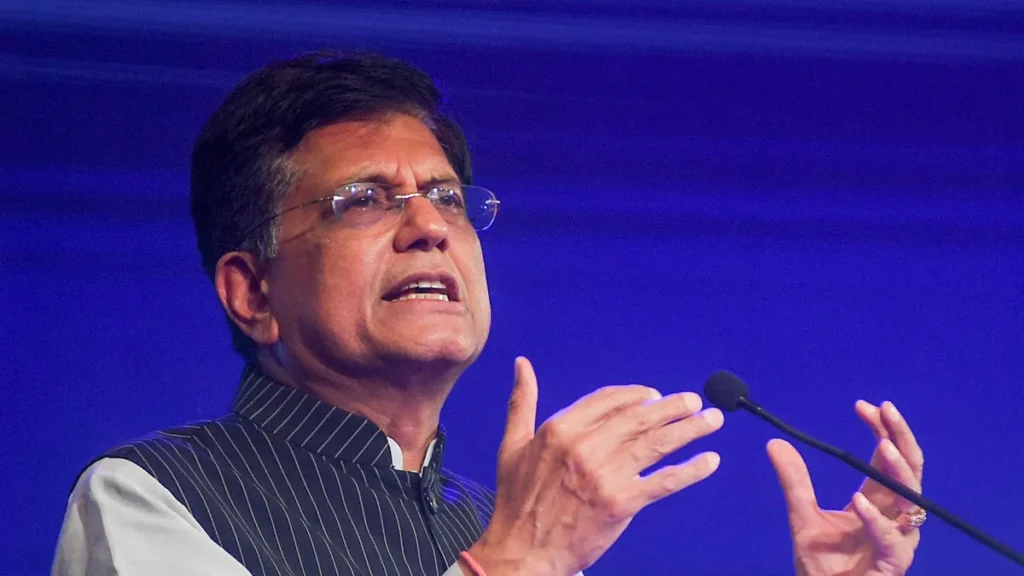Piyush Goyal (Minister of Commerce and Industry) has sharply criticized Amazon’s e-commerce practices, particularly alleging predatory pricing. His remarks highlight broader concerns about the rapid growth of e-commerce in India and its impact on local businesses and consumer behavior.
Piyush Goyal’s Critique of Amazon’s Pricing Practices
Piyush Goyal has been vocal about what he perceives as unfair pricing strategies employed by Amazon. In his latest statements, Goyal accused Amazon of engaging in predatory pricing—a practice where a company sets prices significantly lower than competitors to drive them out of business or undermine market competition.
Goyal highlighted a recent incident where Amazon reportedly incurred a substantial loss of ₹6,000 crore. He suggested that such financial losses could be indicative of predatory pricing tactics designed to dominate the market and harm local retailers. According to Goyal, this strategy undermines fair competition and threatens the viability of small and medium-sized enterprises (SMEs) in India.
The Broader Context: E-Commerce Growth and Its Challenges
The criticism from Goyal comes amid a broader discussion about the growth of e-commerce in India. While the expansion of online shopping platforms has been seen as a sign of technological advancement and consumer convenience, it has also raised concerns about its impact on traditional retail sectors and consumer behavior.
1. Rapid E-Commerce Expansion: India’s e-commerce sector has experienced explosive growth in recent years. The rise of online shopping has altered consumer habits, with more people opting for the convenience of digital transactions over traditional brick-and-mortar stores. However, this rapid growth has not been without its challenges.
2. Impact on Local Retailers: One of the primary concerns is the impact of e-commerce on local retailers. Many small businesses struggle to compete with the massive scale and aggressive pricing strategies of large online platforms. Goyal’s remarks reflect worries that the dominance of major e-commerce players could lead to the erosion of local retail businesses, potentially resulting in job losses and economic disruption in local communities.
Piyush Goyal’s Broader Critique of E-Commerce Trends
In addition to his criticism of Amazon, Piyush Goyal has expressed broader concerns about the growth of e-commerce in India. He has indicated that the rise of online shopping should not be viewed as an unqualified success but rather as a phenomenon that needs careful regulation and oversight.
1. Concerns About Consumer Behavior: Goyal has suggested that the burgeoning e-commerce sector may contribute to unhealthy consumer habits, such as excessive screen time and a sedentary lifestyle. His comments reflect a concern that increased online shopping could exacerbate issues related to physical health and well-being.
2. Regulatory Challenges: The rapid expansion of e-commerce presents challenges for regulators trying to keep pace with technological advancements and market changes. Goyal’s critique highlights the need for robust regulatory frameworks to ensure fair competition and protect the interests of local businesses and consumers.
Reactions from Industry and Analysts
The response to Goyal’s criticism has been mixed, with various stakeholders weighing in on the implications of his remarks.
1. Industry Response: Amazon and other e-commerce giants have defended their pricing strategies, arguing that competitive pricing is essential for providing value to consumers. They assert that their practices contribute to consumer choice and drive innovation within the market.
2. Analyst Perspectives: Analysts have noted that while Goyal’s concerns about predatory pricing are valid, the e-commerce sector also offers significant benefits, including increased access to products and services, greater convenience, and lower prices for consumers. The challenge, they suggest, lies in finding a balance between fostering a competitive market and ensuring that local businesses are not unfairly disadvantaged.
The Path Forward: Balancing Growth and Fair Competition
As India continues to navigate the complexities of its rapidly growing e-commerce sector, several key considerations will be crucial in balancing growth with fair competition:
1. Strengthening Regulatory Frameworks: There is a need for stronger regulatory measures to address issues related to predatory pricing and ensure that large e-commerce players do not undermine fair competition. This includes enforcing transparency in pricing and preventing practices that could harm local retailers.
2. Supporting Local Businesses: Efforts to support local businesses in the face of e-commerce competition are essential. This could involve providing resources and assistance to SMEs, promoting digital literacy, and creating initiatives to help them compete more effectively in the online marketplace.
3. Ensuring Consumer Protection: Protecting consumer interests should remain a priority. This includes safeguarding against unfair practices, ensuring data privacy, and maintaining the quality and reliability of products and services offered through online platforms.

